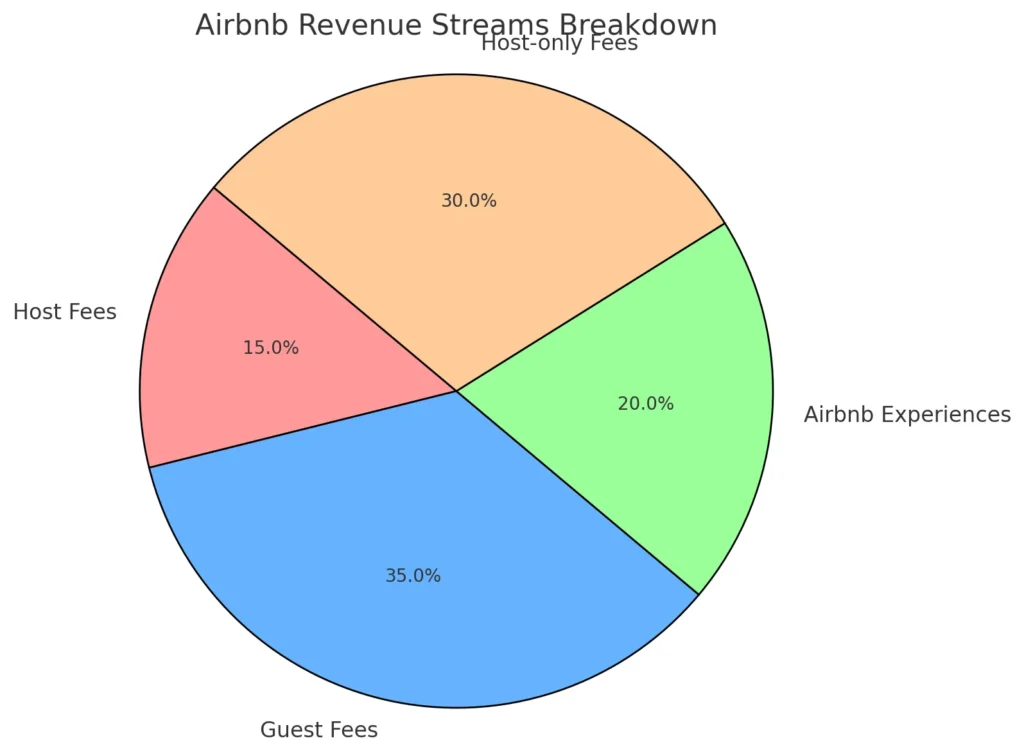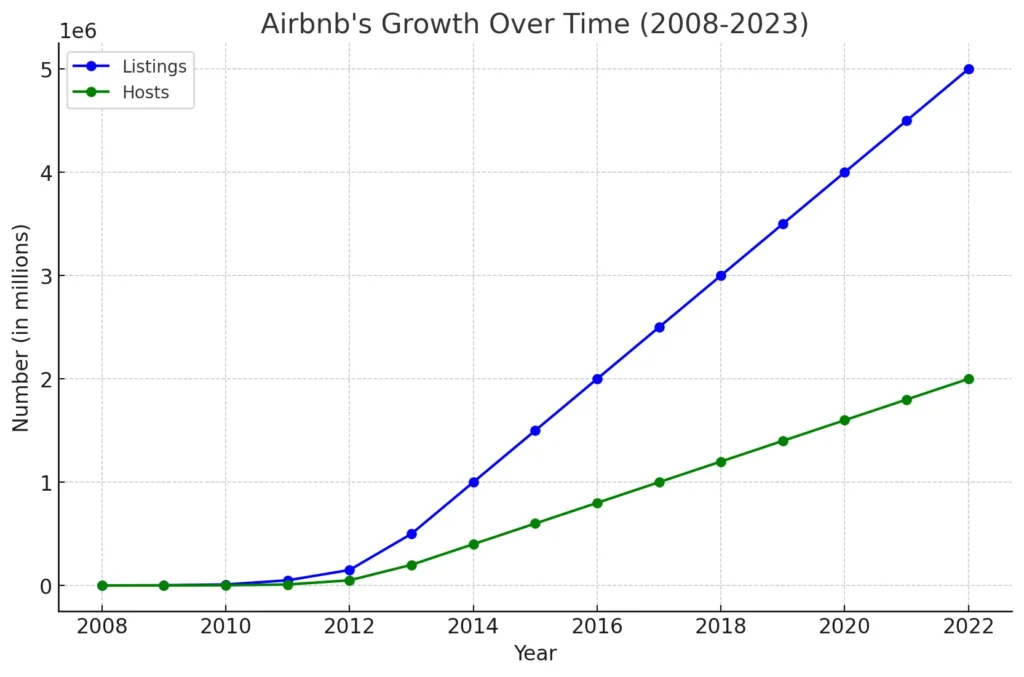Airbnb has revolutionized the travel and hospitality industry, offering an alternative to traditional accommodations by allowing people to rent homes, rooms, or unique spaces directly from hosts worldwide. Since its launch in 2008, Airbnb has grown from a simple concept into a global platform connecting millions of travelers with hosts, covering over 220 countries.
The platform operates as part of the sharing economy, a model where users share underutilized resources, such as homes, for short-term rentals. Starting an Airbnb-like app allows entrepreneurs to tap into this growing market, offering travelers unique and flexible lodging options. Airbnb leads the vacation rental market, setting the standard for travel apps and reshaping how people experience lodging. Through its peer-to-peer marketplace, it provides not just a cost-effective solution but also a more authentic and immersive travel experience, giving travelers access to local culture and unique stays.
This transformation has positioned Airbnb as the go-to platform for vacation rentals and short-term accommodation, blending technology with a user-centric approach to become a key player in the global travel ecosystem.
What is Airbnb’s Business Model?
Airbnb’s business model operates as a multisided platform, connecting two main user groups: hosts and guests. Hosts, who are property owners or renters, list their spaces for short-term rental, while guests (travelers) book these spaces through Airbnb’s app or website. Airbnb generates revenue by charging service fees to both parties during each transaction.
Unlike traditional hospitality, Airbnb doesn’t own properties. Instead, it facilitates peer-to-peer interactions, offering unique, often more affordable lodging options than hotels, and providing hosts with an opportunity to earn extra income by renting underutilized spaces. This flexible model, built on trust and community, sets Airbnb apart from traditional hotel chains by fostering local, authentic experiences while offering competitive pricing.
Also Read :- How to Build a Website Like Airbnb – Complete Guide
Key Components of Airbnb’s Business Model
Customer Segments
Airbnb’s primary user groups are hosts and guests. Hosts offer their properties, such as spare rooms or entire homes, while guests seek short-term stays and local experiences. Both segments drive the platform’s success.
Value Propositions
- For Hosts: Airbnb provides a way to monetize unused spaces with flexible pricing, along with security features like guest reviews and insurance coverage.
- For Guests: It offers cost-effective alternatives to traditional hotels, with access to unique and local stays that enhance the travel experience.
Channels
Airbnb primarily reaches its users through its website, mobile app, and strong engagement via social media. These platforms allow seamless browsing, booking, and communication between hosts and guests.
Revenue Model
Airbnb generates income from several streams:
- Host Fees: Hosts are charged around 3-5% per booking.
- Guest Fees: Guests pay service fees ranging from 0-20%, depending on the property and booking size.
- Airbnb Experiences: Hosts offering tours or activities are charged a 20% fee. This expands Airbnb’s offerings beyond just accommodations.

How Airbnb Makes Money
Airbnb’s revenue model is primarily driven by various fees collected from both hosts and guests. Here’s a breakdown of its main revenue streams:
- Host Fees: Airbnb charges hosts a commission of 3-5% of the total booking amount. This helps cover platform maintenance and payment processing.
- Guest Fees: Guests are charged a service fee ranging up to 20%, depending on the booking total and location.
- Airbnb Experiences: Airbnb takes a 20% cut from hosts offering experiences like tours and activities.
- Host-Only Fees: Professional property managers or hosts using software integrations may pay higher host-only fees, typically between 14-16%, especially for services like Airbnb Plus or stricter cancellation policies.
These diversified revenue streams have made Airbnb highly profitable, allowing the company to expand globally and offer various services beyond simple accommodation bookings.
Dreaming of a profitable Airbnb rental business?
We help you with everything—from standout listings to
seamless guest experiences. Ready to turn
bookings into big returns?
Technology Infrastructure in Airbnb
Tech Advancements
Airbnb leverages artificial intelligence (AI) and data analytics to optimize pricing, offer personalized recommendations, and improve the user experience. AI helps predict demand and set competitive prices, benefiting both hosts and guests.
Mobile-First Strategy
Airbnb’s growth is heavily driven by its mobile app, which allows seamless access for travelers and hosts to list, search, and book accommodations on the go. The app’s intuitive design ensures an easy user experience.
Scalability and Platform Maintenance
With millions of listings worldwide, Airbnb’s platform is designed to scale efficiently, managing vast data through a robust cloud infrastructure. This ensures smooth transactions and platform stability across regions.
Regulatory and Legal Challenges
Airbnb faces significant regulatory challenges across different regions. Zoning laws in many cities restrict short-term rentals, and tax regulations vary widely, often requiring Airbnb to collect and remit occupancy taxes.
In certain cities, regulations mandate hosts to register their properties, set limits on rental days, or ban short-term rentals in specific zones. These legal frameworks impact Airbnb’s ability to operate freely and have led to legal disputes. Airbnb has adapted by complying with local laws, though these regulations can slow its growth in highly regulated markets.
Airbnb must navigate complex legal frameworks, varying from city to city, to ensure compliance with local regulations. Hosts are advised to review Airbnb’s Responsible Hosting Guidelines to stay informed about local rules and regulations.
Airbnb Business Model Canvas
The Airbnb Business Model Canvas provides a structured view of how the platform functions:
- Customer Segments: Primarily two—Hosts (property owners) and Guests (travelers).
- Key Resources: The Airbnb platform, mobile app, host properties, data infrastructure, and human resources.
- Key Activities: Platform development, user acquisition, customer support, and maintaining trust through features like user reviews.
Trust and reputation are central to Airbnb’s success. Its review system fosters accountability, ensuring guests and hosts build credibility through transparent ratings and feedback. This system encourages safe and reliable transactions, helping Airbnb maintain a strong community focus.
Competitive Landscape
Airbnb faces strong competition from other vacation rental platforms like Vrbo, Booking.com, and HomeAway, each offering similar services but with distinct approaches.
- Vrbo focuses on entire home rentals, catering to families and groups.
- Booking.com includes hotels alongside vacation rentals, providing a broad range of accommodations.
- HomeAway emphasizes vacation homes, often for longer stays.
Airbnb holds a first-mover advantage, establishing trust early and fostering a global community. Its differentiation lies in unique stays, local experiences, and a robust review system, giving it an edge over its alternatives.
| Competitor | Key Focus | Differentiation from Airbnb |
| Vrbo | Entire home rentals | Focus on family and group vacation rentals |
| Booking.com | Hotels and vacation rentals | Integration with flights, car rentals, and broader services |
| HomeAway | Luxury vacation homes | Focus on higher-end properties, more luxury options |
| TripAdvisor Rentals | Unique offbeat properties | Focus on niche stays like treehouses and yurts |
Also Read :- Top Vacation Rental Apps Like Airbnb in the USA: Discover the Best Alternatives for 2024
Airbnb’s Growth and Expansion
Airbnb has seen remarkable growth since its founding in 2008, achieving key milestones like:
- Expanding globally into 220+ countries and offering millions of listings.
- Introducing Airbnb Experiences in 2014, allowing travelers to book local activities, further diversifying its offerings.
- Adapting to post-pandemic trends, such as the rise in remote work and demand for long-term stays, which has redefined how travelers use Airbnb, now favoring longer, more flexible stays that merge work and leisure.
This adaptability and innovation have propelled Airbnb’s sustained growth.
Airbnb Revenue Breakdown (2023)

Airbnb reported robust financial growth in 2023, driven by multiple revenue streams:
- Host Fees: Airbnb collects 3-5% from hosts for each booking.
- Guest Fees: Service fees of up to 20% from guests based on the booking total.
- Airbnb Experiences: 20% commission from experiences like tours and local activities.
Following the post-pandemic recovery, Airbnb saw increased demand for long-term stays, driven by the rise of remote work. Additionally, Airbnb Experiences became a major contributor to revenue, offering travelers unique, localized activities beyond lodging.
| Revenue Stream | Details | Percentage/Amount |
| Host Fees | Fees from hosts per booking | 3-5% |
| Guest Fees | Service fees paid by guests | 0-20% |
| Airbnb Experiences | Commission from local activities and tours | 20% |
| Host-Only Fees | Fees for professional property management services | 14-16% |
Challenges & Future of Airbnb
Challenges:
Airbnb faces ongoing legal battles and regulations in various regions, especially regarding short-term rental restrictions, zoning laws, and tax compliance. Additionally, the platform continues to face threats from competitors like Vrbo and Booking.com, pressuring market share.
Opportunities:
Airbnb can capitalize on growing trends such as sustainability initiatives, expanding its long-term rental offerings, and exploring new technologies like AI.
AI and Automation:
The future of Airbnb will likely see greater use of AI and automation to enhance customer experience and improve operational efficiency through smart pricing and personalized recommendations.
As Airbnb continues to expand, its impact on tourism, local communities, and real estate markets is significant, creating both opportunities and challenges. For a deeper understanding of these effects, explore this report.
Conclusion
Airbnb’s innovative business model has redefined the travel and accommodation industry by creating a platform that seamlessly connects hosts and guests worldwide. By leveraging the sharing economy, Airbnb has empowered property owners to monetize unused spaces and provided travelers with affordable, unique, and localized stays. Its focus on technology, user trust, and community has propelled its success.
Looking forward, Airbnb will continue to evolve through sustainability efforts, long-term rentals, and advancements in AI and automation, further enhancing the customer experience and operational efficiency.
Ready to experience the unique opportunities of Airbnb? Explore Airbnb’s services to book your next stay or become a host today and start earning by sharing your space!
Interested in building a successful vacation rental app like Airbnb? Contact Miracuves today to learn how we can help you develop custom vacation rental platforms tailored to your business needs. Transform your idea into a leading digital solution with our cutting-edge app development services!
Have questions about scaling your rental property business?
Let’s Talk About Your Rental Property
Business Growth ! Our industry experts
are here to guide you.
FAQs
What is the Airbnb business model?
Airbnb operates a multisided platform that connects hosts (property owners) with guests (travelers) for short-term rentals. The platform generates revenue by charging fees to both hosts and guests.
How does Airbnb make money from hosts and guests?
Airbnb charges hosts a commission of 3-5% per booking and guests a service fee of up to 20%.
What are Airbnb Experiences?
Airbnb Experiences are activities and tours hosted by locals, allowing travelers to engage in unique experiences.
How does Airbnb handle legal and regulatory issues?
Airbnb works with local governments to comply with zoning laws, tax regulations, and short-term rental policies, adapting its operations accordingly.
How does Airbnb compete with traditional hotels?
Airbnb offers more affordable, diverse, and local accommodations, focusing on unique stays and experiences that provide a more personalized travel experience than traditional hotels.
Check out our popular rental app solutions offered by Miracuves – built for versatility, performance, and scale:
- Airbnb Clone Solution – A powerful platform like rental app for booking stays, ordering food, hailing rides, making payments and more.
- Zillow Clone Solution – A powerful property listing solution inspired by Zillow, offering advanced search filters, map-based browsing, and real-time updates for buyers, sellers, and renters.
- Blueground Clone Solution – A platform like Blueground for booking fully furnished, long-term rentals through an easy-to-use app built for modern.
- Buildium Clone Solution – An all-in-one app like Buildium for property managers and landlords to handle rentals, payments, maintenance and more.
- Dream Yacht Charter Clone Solution – A yacht booking platform like Dream Yacht Charter that lets users easily reserve bareboat or crewed charters.








